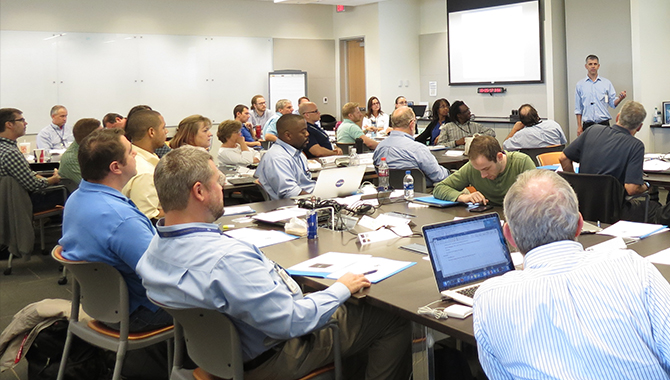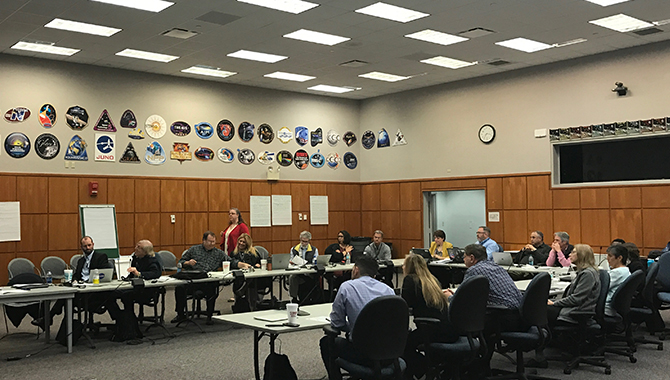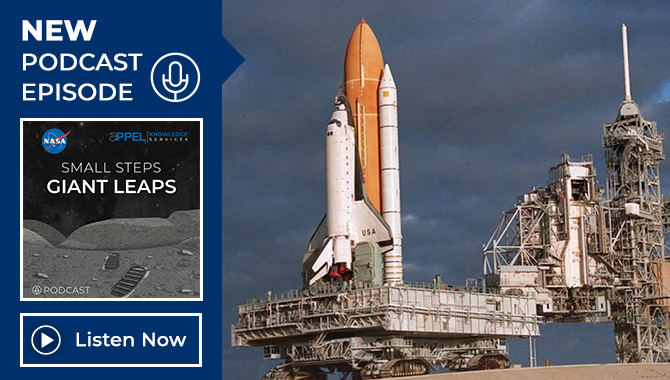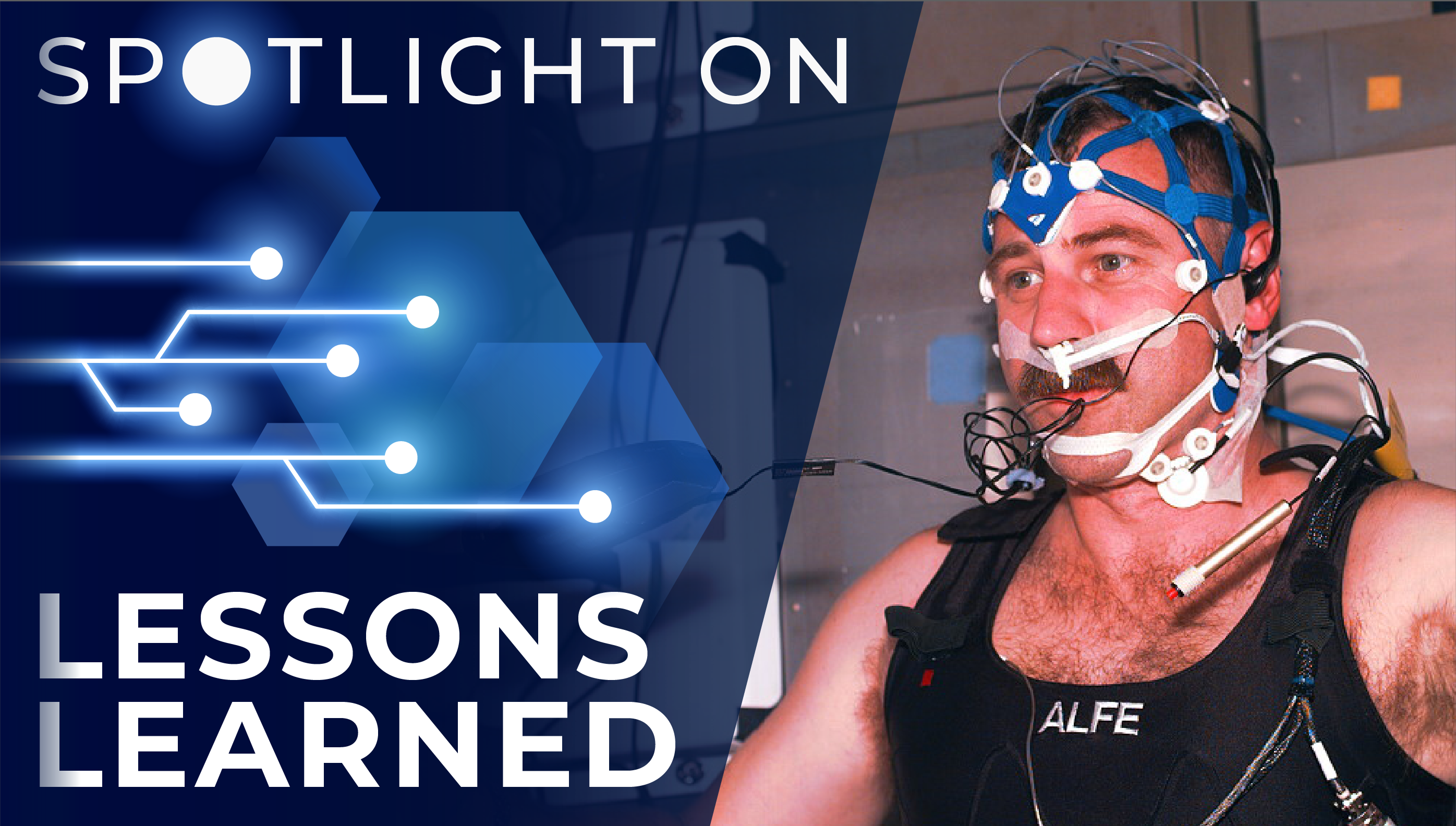
The Coronavirus pandemic forced APPEL Knowledge Services to cancel all face-to-face training and convert more than 80 percent of its courses—such as this one, Cognitive Bias in Engineering Decision-Making with instructor Matthew Kohut—to virtual delivery.
Credit: NASA/Donna Wilson
With a new category of courses, APPEL Knowledge Services is utilizing NASA’s wealth of organizational knowledge to help practitioners advance mission success.
The philosopher George Santayana once said, “Those who cannot remember the past are condemned to repeat it.” Given its extensive history of complex programs and projects, it’s easy to imagine that individuals at an organization as large as NASA might lose sight of the agency’s past experiences and the lessons gained from them. Fortunately, NASA ensures the lessons—both positive and negative—from its past remain accessible by supporting a range of lessons learned repositories, including the public Lessons Learned Information System (LLIS) and the proprietary version available to the NASA workforce. Per NASA policy, practitioners are urged to contribute their lessons to these databases in order to benefit future projects.
However, creating a database of lessons learned may not be enough to change the thinking and behaviors that impact project success. Agency personnel must also access the past lessons, learn how to assimilate the knowledge, and employ the learnings effectively in their current projects. With that in mind, APPEL Knowledge Services developed Lessons Learned for Mission Success: a new category of courses designed to teach practitioners how to utilize lessons learned in order to develop effective decision-making skills that actively benefit their day-to-day work.
The courses in this category employ engineering design and project management case analyses as the foundation for teaching critical skills and new ways of thinking about problem solving. A common thread linking the courses is a close examination of the NASA Challengercase. Each course considers the case from a different perspective, encouraging participants to utilize a distinct set of conceptual and practical tools to derive lessons from the case. Individual courses highlight other cases as well to explore relevant lessons and drive home key learnings. Overall, the focus remains on using the cases to engage participants, expand their perspectives, and refine their thinking and decision-making abilities.
Six Lessons Learned for Mission Success courses are currently available and will be offered during the fourth quarter of fiscal year 2018 (FY18), which begins on July 1, 2018:
Cognitive Bias in Engineering Decision-Making
Over the course of a project, teams must make thousands of decisions. This one-day course supports their efforts by highlighting the central role that poor communication and cognitive biases can play in mishaps, accidents, anomalies, and failures. Participants begin to consider how to mitigate the impact of heuristics (mental shortcuts)—such as groupthink, optimism bias, confirmation bias, and the normalization of deviance—on engineering-related decisions.
Complex Decision-Making in Project Management
The goal of this two-day course is to provide, through the examination of lessons learned derived from pertinent case studies, multiple opportunities for participants to exercise and improve their decision-making and critical thinking skills through facilitated group discussions.
Critical Thinking and Problem Solving
During this three-day course, participants learn to leverage the science of thought to maximize the likelihood of identifying solutions to unique challenges. A key focus is on exploring—and learning to apply—current theories of problem analysis, critical thinking, and decision-making.
Engineering Success and Failure Analysis Workshop
The focus of this three-day course is on helping participants develop innovative decision-making frameworks that can support their current work at NASA. Participants uncover the technical, process-, and judgement-related causes of engineering design failures. On the last day of the training, they create a decision-making framework and methodology that leverages collaborative tools and methods in order to increase the likelihood of project and program success.
The Engineer’s Briefcase
Participants utilize forensic analysis and decision-making role play to develop lessons learned from engineering successes and failures. Facilitated group forensic analysis and role-play activities that emphasize real-time engineering decision-making help participants expand their decision-making skillsets.
Systems Thinking Across the NASA Project Lifecycle
Throughout the life cycle of a project, challenges occur in a variety of contexts, including the systems thinking context, the technical baseline context, and the project management/safety and mission assurance context. This two-day course introduces a threaded case study to help participants define and utilize effective mental models to analyze and respond to challenges arising across the project life cycle.
A seventh course, Pay It Forward: Capturing, Sharing, and Learning NASA Lessons, has been developed and will be piloted during Q4 FY18. The course features an interactive experience designed to help attendees appreciate, explore, develop a deep understanding of, and familiarize themselves with the tools, templates, techniques, processes, and best practices in place at NASA today for capturing, sharing, and learning lessons.
“At APPEL Knowledge Services, we offer a range of tools and resources to help NASA’s technical workforce identify, capture, and access lessons learned from current and past projects,” said Roger Forsgren, NASA Chief Knowledge Officer and APPEL Director. “But we wanted to go even further by delivering courses that ensure practitioners understand how to think about those lessons in a way that enables them to apply the rich learnings to benefit their everyday work. By doing this, they are better able to successfully execute NASA’s mission.”
Visit the APPEL Knowledge Services Course Catalog for more information about the Lessons Learned for Mission Success course offerings or to register for a particular course.
Explore lessons learned databases at NASA.
Discover knowledge sharing tools and resources on the APPEL Knowledge Services website.









